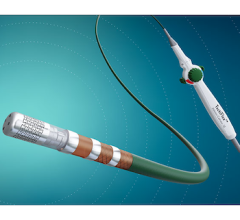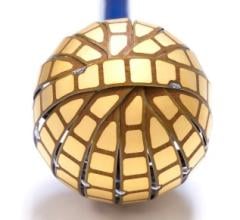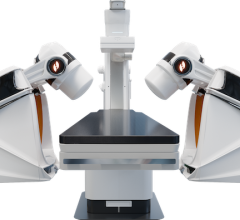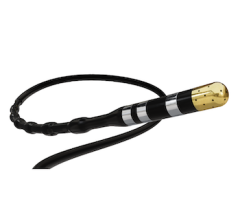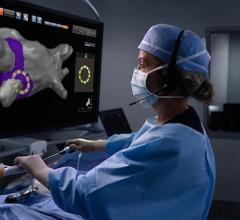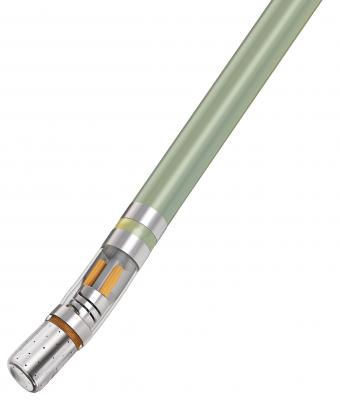
August 15, 2016 — The U.S. Food and Drug Administration has granted market approval for the Biosense Webster Thermocool Smarttouch SF Catheter. The catheter is the only approved device pairing contact force technology with a porous tip irrigation designed to optimize efficiency. This optimizes efficiency by providing uniform cooling at half the flow rate of earlier generation irrigated catheters, easing the fluid management process. The electrophysiology (EP) device is designed to treat patients with Atrial fibrillation (Afib).
"The Thermocool Smarttouch SF Catheter is an exciting development for patients and electrophysiologists alike, addressing many of the challenges faced using earlier technologies," said Larry A. Chinitz, M.D., professor of medicine and cardiac electrophysiology and clinical director of the Leon Charney Division of Cardiology at the New York University School of Medicine. "With its combination of contact force technology and porous tip design, the device integrates two important features in a way that will help physicians like myself improve outcomes for patients being treated with catheter ablation."
Clinical data has demonstrated the safety of the device when used to treat drug refractory paroxysmal atrial fibrillation. The SMART-AF trial, a multicenter, prospective study of the earlier generation Thermocool Smarttouch technology, revealed no unanticipated adverse events and demonstrated a success rate of greater than 80 percent, with increased stability within the contact force range.[1] Success is defined as freedom from any atrial arrhythmia (atrial fibrillation, atrial flutter, atrial tachycardia) 12 months post procedure when operator remained in the preset contact force range.
Further sub-analysis showed that when the contact force was within investigator-selected range ≥ 85% of time, success was increased by 21% to 88% (≥ 85%: n = 32; < 85%: n = 73). The more recent SMART-SF study, which tested the newest generation Thermocool Smarttouch SF Catheter, demonstrated excellent safety results as well.[2] The study found an 18.7 percent reduction in overall procedure time and a 14.2 percent reduction in overall ablation time when compared to the SMART-AF study. It also demonstrated a 55.2 percent reduction in total fluoroscopy time, limiting radiation exposure to patients.[3]
"The Thermocool Smarttouch SF Catheter represents a significant advancement for the clinical community," said Dr. Andrea Natale, Executive Medical Director of the Texas Cardiac Arrhythmia Institute at St. David's Medical Center in Austin, Texas. "Conducted trials, including the SMART-AF and SMART-SF studies, have shown Biosense Webster technology enables physicians to achieve targeted stability in the defined contact force range, leading to shorter procedure times and enhanced results without compromising safety."
The catheter is seamlessly integrated with the Carto 3 System, which combines contact force technology, 3-D mapping and advanced navigation capabilities to provide active measurement of stable contact force and catheter tip location.
The Thermocool Smarttouch SF Catheter is available for commercial sale in the United States and Europe.
Atrial Fibrillation and Contact Force Therapy
Afib is the most prevalent heart rhythm disorder and a leading cause of stroke among people 65 years and older. An estimated 3 million people in the United States and 20 million worldwide are affected by Afib, and its prevalence is projected to increase significantly as the population ages.[4] Afib is a progressive disease and increases in severity and frequency as patients get older. Left untreated, it can lead to heart valve disease, sleep apnea, chronic fatigue, congestive heart failure and stroke. The public health implications of Afib are a growing concern because those with Afib are at an increased risk of morbidity and mortality, as well as a reduced quality of life. It is estimated to be responsible for 88,000 deaths and $16 billion in additional costs to the U.S. healthcare system on an annual basis.[5]
During catheter ablation, doctors insert a therapeutic catheter through a small incision in the groin, where it is then weaved up to the heart through a blood vessel. Once it reaches the left upper chamber of the heart (atrium), radiofrequency energy is delivered to the heart wall to create lesions that block faulty electrical impulses that can cause heart rhythm disorders.
For more information: www.biosensewebster.com
References:
1. Natale A, et al. "SMART-AF trial." J Am Coll Cardiol. 2014; 64(7): 647-656. Biosense Webster, Inc. Final Clinical Report, October 2014.
1. THERMOCOOL SMARTTOUCH Catheter IFU (M-5276-693/694)
2. Prospective Safety Assessment of the THERMOCOOL SMARTTOUCH SF Family of Contact Force Sensing Catheters for the Radiofrequency Ablation Treatment of Drug Refractory Symptomatic PAF (Smart-SF). Biosense Webster Inc. Final Clinical Report, January 2016
3. Compared to SMART-AF study.
4. Naccarelli GV, Varker H, Lin J, Schulman KL. "Increasing prevalence of atrial fibrillation and flutter in the United States." Am J Cardiol.2009;104:1534-1539.
5. Kim MH, Johnston SS, Chu BC, Dalal MR, Schulman KL. "Estimation of total incremental health care costs in patients with atrial fibrillation in the United States." Circ Cardiovasc Qual Outcomes 2011;4:313–320.


 February 06, 2026
February 06, 2026 
